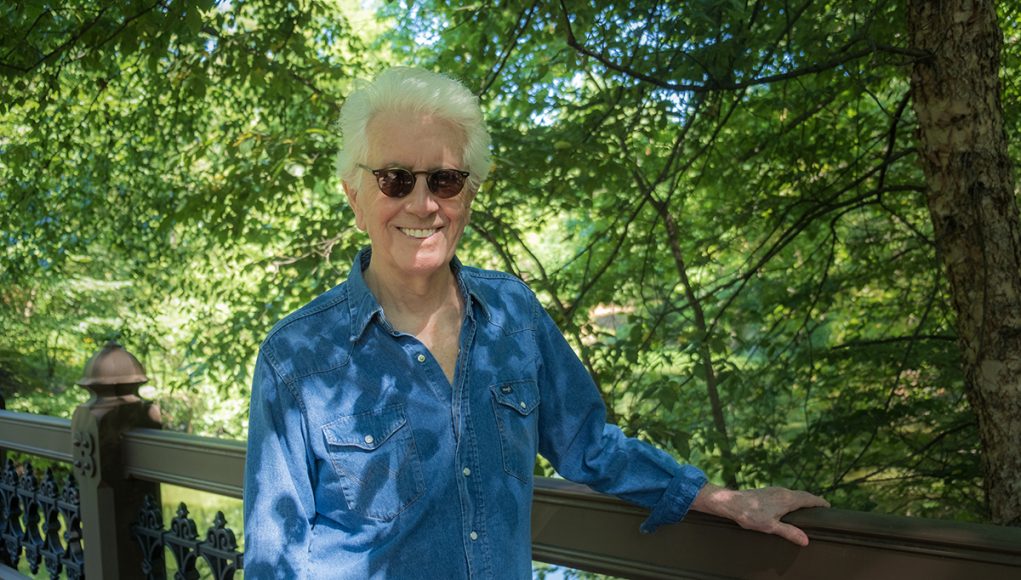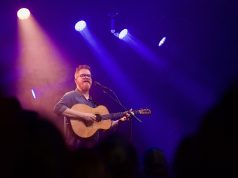Graham Nash is a true legend in acoustic music. He left seminal pop group The Hollies in 1968, to relocate to California and join David Crosby and Stephen Stills to form the legendary Crosby Stills and Nash. Graham has lived in America since then, and currently owns an apartment in downtown Manhattan, where AR’s Andy Hughes joined him for an extensive conversation about his life and career.
Last time we spoke, we talked about your extensive collection of acoustic guitars, about sixty of them at the last count. What influenced your choices in buying each guitar?
Well, I sold most of them a few years ago, but what always helped me to choose a guitar was, if it felt as close to the person who played it as possible. I have a guitar owned by BB King, and I wanted it because it had a vibe about it that made me think of him, and that’s been the guide all the way along. A feeling, an atmosphere, a link to whoever owned and played the guitar before it came to me. I’ve always wanted to be as close to the flame as possible, without getting my ass burned!
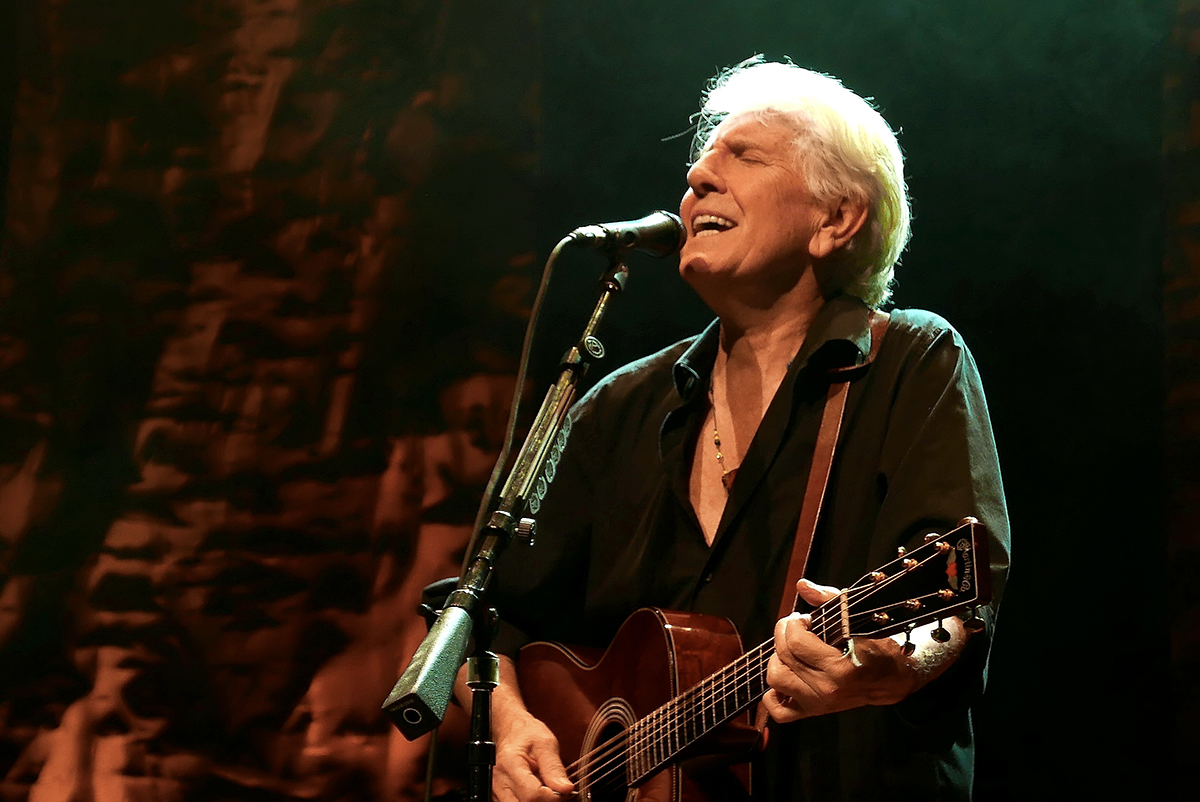
Are all your guitars pre-owned?
Most of them are, yes. I’ve got guitars from Stephen (Stills) and David (Crosby), but the favourites in my collection are the Martin Signature guitars that were made for me.
I often ask the question about Signature guitars – how do you describe to a luthier what you want in a guitar? It must be like trying to describe a colour, because everyone sees colour differently.
I talked to my good friend Alan Rogan, who passed away a few years ago, he was guitar tech for Pete Townsend, and my own guitar guy, John Gonzalez, who has been with me for more than thirty years. I told both of them what I wanted, and left it with them to talk to the guys at Martin about what sort of guitar I would like. Whether it would have twelve or fourteen frets, what the wood used would be. I did check out the woods available, and I found this dark maple that I really liked, and I play the two guitars Martin made for me a lot.
Were you specific about features like the neck width, in order to fit in with what is comfortable for you when you are playing?
Yes, I did, I like a wider neck. I’m not a great technical guitar player, and I have eighty-three-year-old fingers, so a wider neck suits me better. I like twelve-fret guitars, and I don’t like cutaway body designs, and I really like the shapes of the D28 and the D45.
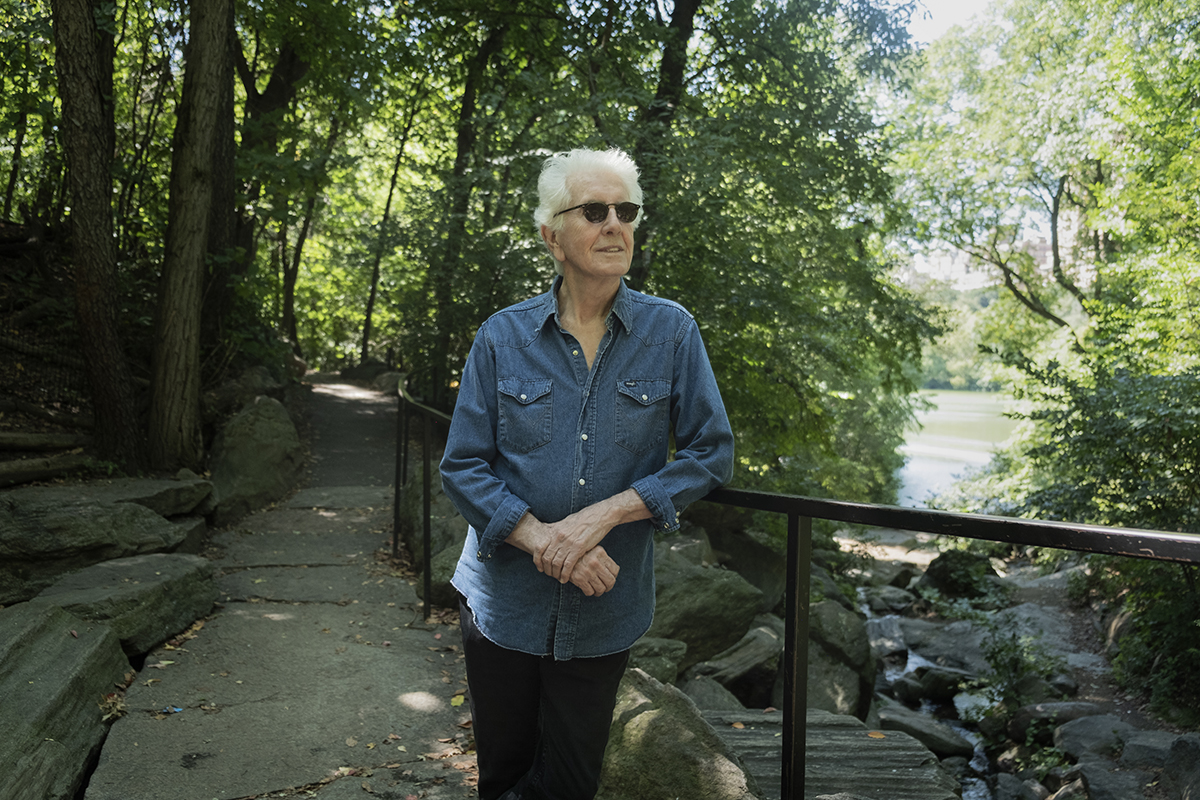
You look remarkably fit and healthy for a man of eighty-three, do you have any fitness regimes to keep you in shape?
Do you know, I don’t actually do anything in terms of taking care of myself, but one thing that I think is essential, and that is that I absolutely love what I do. I’m a musician, I love to write songs, and my songs are written from my heart. As I have said before, and it’s absolutely true, I am an ordinary person who is blessed to be able to do extraordinary things. When I come back to Manchester on tour, and I will do this on my new tour with Peter Asher opening for us, I will stand on the steps of the Midland Hotel in Manchester, where I once wrote a song called Cold Rain, and I will look at all the people going about their lives. And I know that a lot of them are doing jobs that they don’t really enjoy doing, and I think about how lucky I am to really love doing what I do.
Which guitars are you bringing with you on your UK tour?
I am playing entirely acoustics on this tour, and I have a Gibson Acoustic, and my two Graham Nash Signature Martins, probably four or five guitars to play at various times in the shows.
You are missing one particular guitar, that you wrote Teach Your Children on, did it ever come back to you?
It never did, sadly. It’s a 1962 Epiphone Texan, I bought it in 1962 from Barratts Music Store in Manchester. I sprayed it black, and put a double pick guard on it, like the Everly Brothers had on their guitars. I wrote a lot of songs on it, Teach Your Children, as you mentioned, and I wrote Marrakesh Express, and I really would love to get it back, if anyone knows where it is now. I’m trying to find the serial number for it, so I can post something on social media, and see if anyone has any information. I know that the people who handled my finances about thirty years ago may have the number in their files, so I am trying to get that, and go from there.
When you set up your tour, are there any requirements from a venue that you ask in advance?
No, not really at all. I like a glass of water to be available, and the other players probably want the same thing. We don’t have a big list of demands like Van Halen having a bowl of M & M’s in their dressing rooms with the brown ones taken out! That’s really not our style. When I played Australia last year in January and February, the provided a small salad and fruit bowl with a few crisps, and peanuts, and bottles or water, that’s really all I need. All the technical stuff is taken care of, my crew are really wonderful and take care of everything.
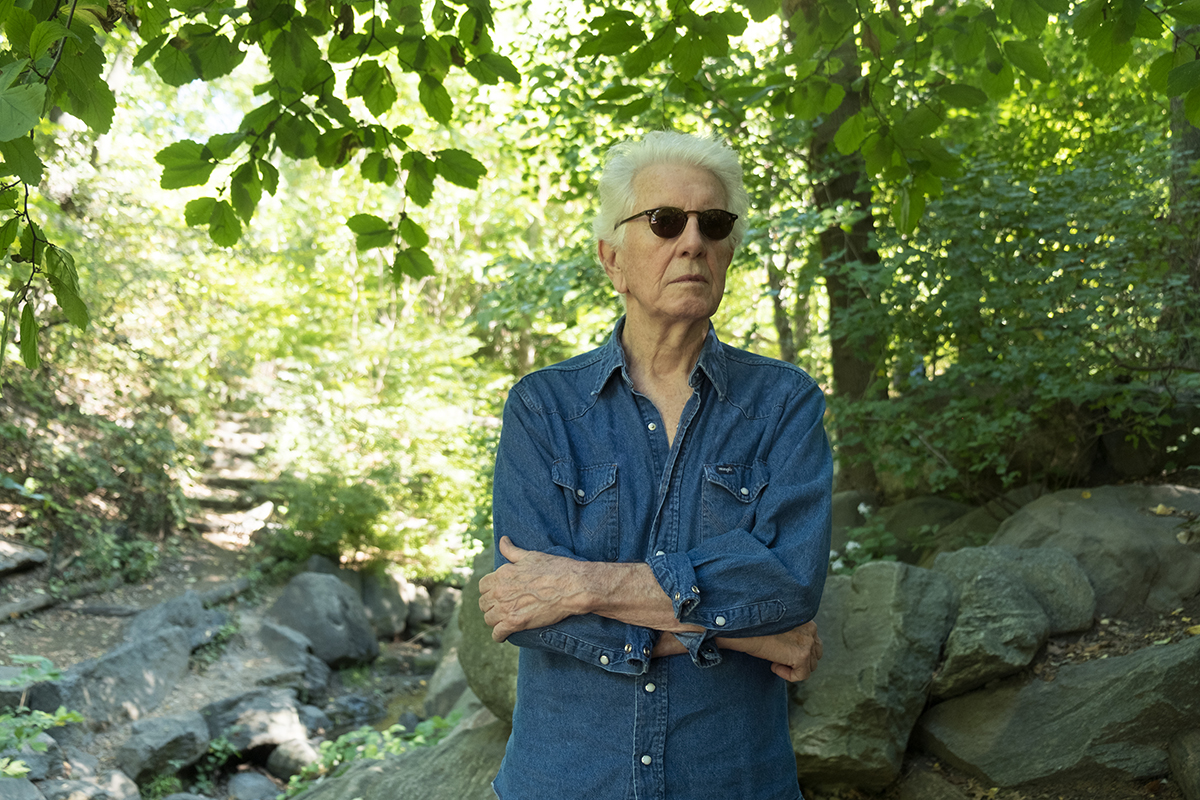
When you are playing a live show, is there anything that can put you off?
Not really, no, I’ve been going for a long time, so I am pretty much comfortable on stage. I’ll tell you what I do love, it’s when people sing along with me, I do enjoy that. When I used to tour with CSN, they really didn’t like people joining in, and they would specifically tell people not to join in with the words. But as far as I am concerned, if you have learned a song enough to sing along with the artist or artists performing it, then as far as I am concerned, you are invested in that song. So, I do encourage people to join in. For me, if people want to sing and join in, then they are very welcome. If people have learned Our House, and Teach Your Children, and they want to sing with me, that’s great. By doing that, they are showing that the songs mean something to them, and that’s what I want as an artist, and a writer, and a performer. I want my work to mean something, I think every performer does. It’s an amazing feeling to me, even if not to other people I have worked with. It’s great being a solo artist, although I do have other musicians with me. It’s nice not having to talk to other people and agree about what we are going to play. I don’t have to deal with anyone else’s opinion, and I love that, everything being down to me. I have done the discussions and the agreements for many years, it’s nice not to have to do that now.
Is there any song you have ever had in any show that you feel will make the audience rise, and it will be the peak of the performance?
I think the shows just build their own momentum as they go, but I know that in Manchester, I will definitely sing Cold Rain again, because it was written in Manchester. Where do you live?
I’m from Stoke-on- Trent, around forty miles south of Manchester.
Ah yes, I remember playing with The Hollies in Stoke-on-Trent, and we played with The Beatles. That was the night we were at The King’s Hall in Stoke, and Paul asked me if I wanted to hear a song they had just written, and I stood between John and Paul and they sang Misery, which they were working on that night, and they gave it to Helen Shapiro. I’ve known The Beatles since 1959, they were in a talent contest we entered, it was myself and Alan Clark, before we formed The Hollies. The Beatles were Johnny And The Moondogs back then.
When you write a song, do you have your mind on playing it on stage, and you keep the guitar work pretty simple, or are you happy to write a more complex guitar parts and practise it enough to play it on stage as you wrote it?
I tend to do a mixture of both, but I do really love simple songs. I can’t do with songs where it takes until the twelfth verse before I have a clue what the singer is on about! I want to get the listener immediately, starting out on the journey with me. I have written some more complex songs, but I like the simple ones. I have written some songs with the music first and the lyrics after, and vice versa. I always have about sixty pieces of music in my head at any one time that may develop into a song. When I hear a melody in my head, I will suddenly think of a lyric that will go with it, and when I have four or five songs together, I know I am on my way to making an album.
Is there any acoustic musician that influenced you as an artist?
The Everly Brothers were very important to me growing up, as was Buddy Holly. Buddy was one of the first musicians to write his own material and take it out live with The Crickets.
Do you miss anything from the UK, having lived in the US for so long?
I do miss the beautiful countryside. I live here in Manhattan which I love, but when I watch BBC programmes on the television, and they go to Dorset or Somerset, and the Lake District, I do love seeing that countryside And I love how friendly the English people are. But I’ve lived in the States for more than fifty years, and I am very happy here.
Last time we talked, we discussed inspiration, and you mentioned two things that were inspiring you at the time, and they were unhappiness and anger. I assume that particularly difficult period your life has passed now, and you have moved on?
Not really! I am still living between love and hate. I am right in the middle. My last album included five songs that were about my wife, and some more about Donald Trump.
Do you practise?
The only practise I do these days, is to get some flexibility into the fingers of my left hand. About a week-and-a-half before a tour starts, I’ll go into my studio here in my apartment where it won’t bother anyone else, and I will do some singing at full strength, so when it comes to proper rehearsals, I am not starting from scratch. And I play my acoustic every night for an hour, to toughen up the pads on my fingers, I don’t want to be sore from the first dates of the tour.
Are there players whose technique you especially admire?
Bert Jansch is one, and Leon Redbone, I love his playing. As an all-round guitar player, acoustic and electric, there are not many better than David Gilmore. I’m still waiting to hear a wrong note from him, and I don’t think I ever will! He’s an amazing player. Jeff Pevar who played with myself and David Crosby for many years is a wonderful guitar player. And all the musicians in my current tour band are wonderful players as well of course. And they are all younger than me, I have to bring my A Game to the stage every night!
What is your view on lessons for acoustic players, as opposed to being self-taught?
I am self-taught myself, I learned from Bert Weedon, the Play In A Day book he wrote, which a lot of players of my generation bought, and figured out the chords and notes from that. But I do think that lessons can be a good way to get you started, learning the basic techniques you need. The theory is that helps you to avoid bad habits, but that doesn’t always mean that’s true. Joni Mitchell learned to play from a Pete Seeger book, and because of the polio she suffered as a child, she could never form an F chord, so she always tuned her guitars so she would never have to play an F chord. So that ‘bad habit’ turned out wonderfully well for her.
Are you a fan of complex tunings?
Not especially, I do like things to be simple as I said earlier. I learned tunings from Joni and from David, but I do tend to keep them pretty straightforward, that suits me better as a player. I think the advantage of writing in a different tuning occasionally, is that it does put your mind in a different place, you do find yourself having different ideas from some of the traditional thoughts you get when you work in tunings that you use regularly. I have written several songs on my keyboard at home, again that takes me out of the standard paths of songwriting.
Do you ever get writer’s block?
No never, because my mind is always busy on the different things that I love to do. I am writing on my second photography book, photography is a major passion of mine, and I collect things, sometimes really obscure and unusual thigs. I have recently acquired the master tracks to Bob Dylan’s first album. I am a big fan of the artist Escher, and he composed a piece called Metamorphosis, there are three parts to it, one of them is twenty-one feet long and I own that now. It’s a reward for all the years I have put into music, that I can now enjoy things like this, and that makes me really happy.
GRAHAM NASH UK TOUR 2025
SPECIAL GUEST ON ALL DATES – PETER ASHER
04 October – Gateshead – The Glasshouse International Centre For Music
05 October – York – Barbican Centre
07 October – Liverpool – Philharmonic Hall
09 October – Cardiff – New Theatre
10 October – Bristol – Bristol Beacon
12 October – Torquay – Princess Theatre
13 October – Birmingham – Symphony Hall
15 October – Glasgow – Royal Concert Hall
16 October – Manchester – The Bridgewater Hall
18 October – Hastings – White Rock Theatre
19 October – London – Palladium
Interview by ANDY HUGHES


